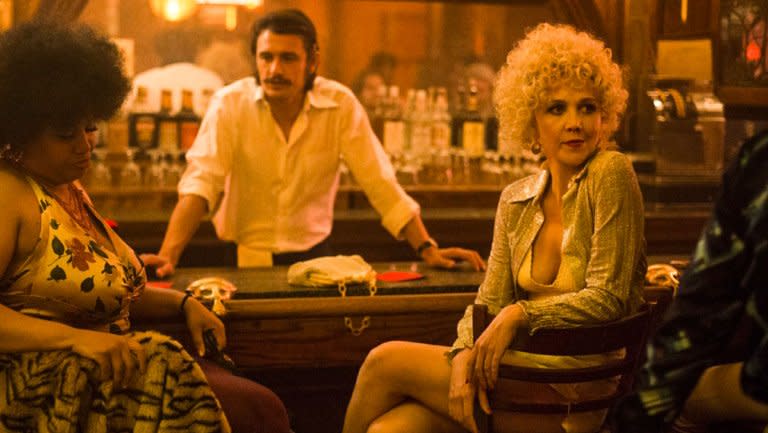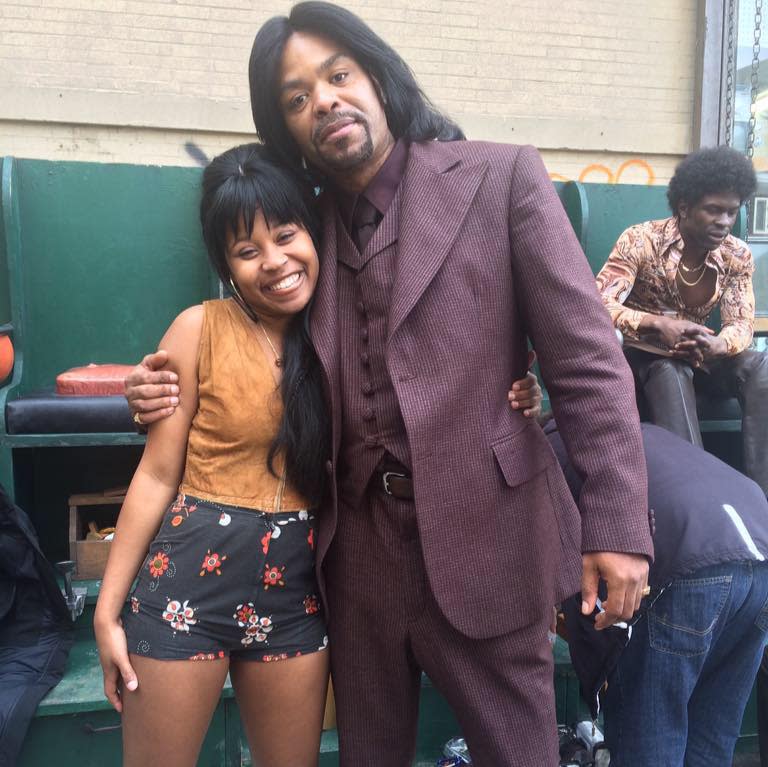'The Deuce': HBO's big, ambitious porn drama

It’s safe to say very few HBO subscribers are going to wish they’d been around for the heyday of 1970s Times Square, the site of the channel’s new prestige product The Deuce, premiering Sunday night. Show creators David Simon and George Pelecanos have, in the tradition of previous collaborations such as Treme and The Wire, done their due diligence in research. Over its eight episodes, The Deuce — possible alternate title: Game of Condoms — takes you for a tourist stroll down New York’s 42nd St. to gawp at strolling prostitutes, strutting pimps, small-time drug dealers, addicts, X-rated bookstores, massage parlors, peep booths, and your random street person peeing in a phone booth, all of it wreathed in swirls of the rank, uncollected garbage that overflowed the neighborhood, thanks to the blind eye of then-Mayor John Lindsay. The Deuce is an anti-nostalgia trip.
The central characters are twin brothers, Vincent and Frankie Martino. Vincent is a decent fellow, a bartender who falls under the patronage of a notably kindhearted organized-crime figure who sets him up with his own Times Square bar, the Hi-Hat. Frankie, more of a disreputable hustler, gets involved in the then-aborning massage-parlor business. The brothers are both played by James Franco, and if you want to yelp, “Please, one Franco is more than enough!” I hear you: I had the same thought. But the actor and the producers manage to pull off this twin act with a minimum of over-Francofication. All by her lonesome is Maggie Gyllenhaal as Eileen, a prostitute who uses the street name “Candy” and who, from the start, is presented as smarter — more savvy and independent — than the sea of female flesh around her. She’s the only hooker here who isn’t under the command of a pimp, and as the series progresses, she evinces an interest to move from in front of the porn camera to behind it as a director and producer. The pimps themselves are also vividly portrayed, and some of them, such as Method Man and Gbenga Akinnagbe, are familiar faces from The Wire.
Simon is working in prime Balzac mode here, cramming lots of vivid characters and subplots into the show — from Vince’s romance with Abby, a posh WASP college student (Margarita Levieva), to the plight of an honest cop (Lawrence Gilliard Jr.), who watches his blue brotherhood skim profits from local businesses. Simon has long approached his TV work as a realist canvas upon which he can explore issues of economic oppression and the exploitation of labor in the class-bound society America refuses to admit it is. One thing that made The Wire one of the greatest achievements ever on television is the way Simon found a way to address these themes within a different institution each season (the school system, city politics, the media, etc.) with rigorous arguments fleshed out by bright, vital characters from every level of society. There was a warmth, a passion, an allowance for humor even amidst tragic circumstances, that ennobled The Wire — but those qualities are somewhat lacking in The Deuce. The show seems oddly squeamish about making enjoyable what was indeed enjoyable about Times Square in this era: its democratic approach to entertainment (this is hinted at in the show’s glimpses of 42nd St. movie houses, where mainstream movies like Patton and M*A*S*H ran alongside cheesy exploitation flicks) and its complication of sex as something more than furtive, shameful pleasure.
I don’t want you to read this as a negative review, however. I gobbled down all eight episodes of The Deuce as quickly as I could, and I was drawn in and fascinated by every minute of it. The Deuce is an admirable piece of work. The novelists Richard Price, Megan Abbott, and Lisa Lutz wrote scripts for the show, and half the episodes are directed by women, including the mighty Michelle MacLaren (Breaking Bad, The Walking Dead), who oversaw the pilot and the season finale. There are some terrific performances here, from Gyllenhaal most of all, but also Franco, Dominique Fishback as a bookish prostitute, and Chris Bauer as a construction worker who finds his true calling as a massage-parlor manager. There are a number of excellent smaller roles as well. David Krumholtz, for example, is terrific as a porn director with a heart of gold. (Additional value: Krumholtz looks like a legendary porn actor of that era, Ron “The Hedgehog” Jeremy.)
But any fair review of The Deuce must grapple with the tricky position Simon finds himself in here. He is obliged, for instance, to present the violence pimps visit upon their charges, yet he’s also well aware of the glorious mythos that numerous African-American writers and filmmakers have constructed around the pimp-as-rebel-adventurer, as one way black men took back some authority from white law-enforcement and racism in general. (Just look at movies set in the same era as The Deuce, such as 1973’s The Mack, the raucous Dolemite in 1975, and most of all, Melvin Van Peebles’s revolutionary Sweet Sweetback’s Baadasssss Song, from 1971.) The Deuce nods to these influences in its numerous, entertaining scenes of the show’s pimps sitting around a coffee shop discussing the exasperating minutiae of pimping. But there is a level on which Simon also knows damn well that if he depicts that violence too vividly, without punishment to its perpetrators, his enterprise will probably be labeled exploitive.
Given his progressive politics, it’s relatively easy for Simon to limit his portrayal of sex workers as female bodies reduced to a commodity (which is, of course, prostitution’s brutal economic model), but since when has Simon ever gone the easy route? The Deuce cannot be removed from the current cultural climate, and in particular the one HBO inhabits just now. It’s been said that HBO needs another Sunday-night hit to take the place of Game of Thrones, whose next season won’t appear for at least a year. You remember Game of Thrones — the fantasy show that was harshly condemned by social media for the way it depicted violence against women, condemnation that made its producers so leery of further criticism that they seemed to soften their storytelling considerably. You can feel a similar constraint against which Simon and his writers, consciously or unconsciously, are pushing during key moments in The Deuce.

The series is set during that brief moment when pop culture and the entertainment business thought porn might break through as mainstream entertainment. The skin industry began imitating its artistic betters, holding — and depicted here in all their tawdry glory — red-carpet movie premieres and industry parties to celebrate the openings of Deep Throat and the gay-porn milestone Boys in the Sand, which insisted on referring to itself as “erotica.” Of course, we know that this breakthrough never ultimately occurred; that Throat star Linda Lovelace would eventually write an autobiography about her captive exploitation. And that the Times Square scene probably peaked with the opening of Show World, on 42nd St. and Eighth Ave. in 1977 — a multi-story Tower of Babe-el combining porn-loop booths and live sex shows conceived as a 24-hour, nonstop semen exploiter.
There was no middle-American embrace of porn as legit entertainment, only the nationwide success of skin-mag publishers like Al Goldstein (Screw magazine) and Bob Guccione (Penthouse) — along with an underground explosion of pornographic films, initially sold on sticky VHS tape for the privacy of one’s own home pleasure. This is one of the reasons Gyllenhaal’s character is constructed around a false premise. Her character arc insists that women, if they had drive and ambition, could break through to make explicit sex movies that had an inherently female point of view, that women could labor shoulder-to-shoulder with men to create a more equal-opportunity industry. But we know that never came to pass. There were no highly successful female porn directors, and has there ever been an accomplished director, female or male, who graduated from XXX-rated porn (as opposed to R-rated exploitation films)? The most women achieved when not being filmed and ogled were production credits in less-popular films (Nina Hartley, for example) or the editorships of soft-core mags (Gloria Leonard and High Society; Dian Hanson’s Juggs and Leg Show).
Thus, Candy/Eileen is really a fantasy; a largely unrealistic character placed at the center of David Simon’s super-realist project. Candy/Eileen is the idealist dream demanded by the proper authorities of pop culture nowadays. Intelligent yet abused, Candy is The Deuce’s equivalent of The Wire’s Bubbles — equally intelligent and abused, a street person doomed to tragedy. The difference between the two is that Simon was able to give Bubbles various scenes that showcased his street smarts and his wry sense of humor; his weaknesses as well as his moral strength. Gyllenhaal inserts that wry humor and wily acuity where she can into her performance, but Candy’s trajectory as a character is limited to a predictable fall-and-rise success story pattern, as more or less demanded by the current cultural atmosphere in which no female protagonist in a prestige project can be depicted as weak or vulnerable or less than a triumphant figure.
More broadly, The Deuce implies that pornography is always grim, degrading stuff — common wisdom in the 21st century. Banished from the current scene are the sorts of feminist, pro-porn arguments once made by the great radical cultural critic Ellen Willis, who in her essential 1979 essay “Feminism, Moralism, and Pornography” argued that to deny the pleasures of porn is to “make a lot of women ashamed of their sexual feelings and afraid to be honest about them.” The Deuce gets at a little of this in its final episode, when Gyllenhaal’s character finally throws off her Candy image to become Eileen, the director of porn scenes from a woman’s point of view. That it took eight episodes to get there suggests two things: that The Deuce is rather muddled in its sense of purpose, and that this show really deserves a second season, to show us whether the series can take Eileen and her sisterhood into a more complex realm.
The Deuce airs Sunday nights at 9 p.m. on HBO.
Read More From Yahoo TV:

